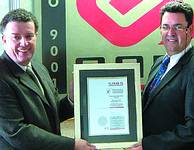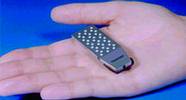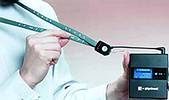
Southern Africa
Reunert has entered the Australian market after purchasing Australian company Heinemann Electric for R25 m. The Melbourne-based company, with an estimated turnover of R80 m, will be incorporated into the company's Circuit Breaker Industries (CBI) operation.
"Altron reported another set of satisfactory results for the year ended 29 February 2004 despite some adverse economic conditions both locally and abroad. Strong advances were also made in terms of its black economic empowerment (BEE) and acquisition programmes," says Dr Bill Venter in his chairman's statement of Altron's annual report for 2004 that has just been released. Venter said the group continued to focus on increasing shareholder value through tighter cost controls, improved customer resource management and enhanced efficiencies, as well as annuity-based income, value-added services and high-growth opportunities.
Despite the slow-down in growth of online retail in South Africa, the number of retail websites has exploded from 215 at the end of 2001 to more than 700 at the end of 2003. This is according to a new survey by World Wide Worx which says that the market is dominated by the top eight online retailers, who between them account for about 80% of all online retail sales in South Africa. The survey found that online sales - which exclude property, cars and travel - increased by 35% in 2003, but is expected to grow by only 25% in 2004. A total of R341m in online retail sales was achieved in 2003, a mere 0,14% of the overall retail market in South Africa, it said.
Concilium Technologies, a supplier of electronic measurement, telecommunications and broadcasting solutions to Southern Africa, has successfully completed its transformation from an ISO 9002 to an ISO 9001:2000 certified company. Picture shows Steve Alves, managing director of Concilium (left) accepting the ISO 9001:2000 certificate from Gert Brink of the SABS.

Overseas
Business
Freescale Semiconductor's planned IPO can be expected to raise around $2,4 bn for the chip maker, according to reports.
Tektronix has reported net sales of $257,8m and net earnings from continuing operations of $26,5m for the fourth quarter ended 29 May 2004. This compares with net sales of $202,3m and net earnings from continuing operations of $4,3m for the same period a year ago. Net earnings from continuing operations were $29,1m for the fourth quarter, as compared with $10,0m for the same period last year. For year 2004 the company reported net sales of $920,6m, 16% growth over sales of $791,0m in fiscal year 2003. Net earnings were $118,2m for the year, compared with net earnings of $35,1m for year 2003.
Companies
Tektronix has acquired communications software group Inet Technologies, for around $325m. The move is intended to accelerate product development in test gear for next-generation mobile and IP-based networks. Inet will become part of Tektronix's communications and video business group.
Cypress Semiconductor will acquire FillFactory, a Belgium-based specialist in active pixel CMOS image sensors, for $100m cash. FillFactory is a spin-off from Belgian research group IMEC.
International Rectifier has entered into a definitive agreement to acquire the speciality silicon epitaxial services business of materials supplier ATMI for up to $41m in cash.
Motorola has signed an agreement to acquire Force Computers, a designer and supplier of open, standards-based and custom embedded computing solutions for OEMs.
Synopsys has acquired 19,9% of HPL Technologies, a provider of yield optimisation solutions for the semiconductor and flat panel display industries.
Xelerated, a network processor specialist company, has teamed with Infineon Technologies to develop reference designs that could be adapted for either multiservice switching platforms or multiservice provisioning platforms. The designs are intended for customers in the emerging 'data-aware' transport market where Ethernet MPLS/VPLS-based data networking is added on top of SDH/Sonet or RPR, said the companies.
Toshiba is the latest investor in Sonics, a SoC developer whose SMART Interconnect IP products have been widely adopted. The new $10m investment brings the company's total Series C funding to $35m.
Japan's Renesas Technology has implemented a new cost-cutting program and re-organised into three new groups: System Solution, Standard Products, and Memory. The company said the new arrangement is designed to move it from a product, to a solutions-oriented supplier of semiconductors. The 'BEP100 project' is the company's cost-cutting plan devised to lower its material, outsourcing, logistics, labour, and related costs.
Intel has established its Corporate Technology Group in Denmark and opened the Copenhagen Design Lab. The research lab's research focus will be on signalling circuits and copper-based interconnects for Intel future microprocessors, chipsets, and platforms.
Spescom Software has announced the establishment of the Spescom Nuclear Advisory Council, composed of experts from across the nuclear market including customers and industry representatives. The Spescom Nuclear Advisory Council will examine issues and topics of interest to the industry, especially those related to configuration, change, asset and content management.
Industry
While being somewhat limited in future growth due to increased use of ASSPs (application-specific standard products), embedded dynamic random access memory (eDRAM) will still be a necessity for some high-performance infrastructure applications, according to In-Stat/MDR. As a result, this market will see its worldwide revenues grow from $124,7 m in 2003 to $255,1 m by the year 2008, representing a growth rate of 13,2%.
Western European and North American market demand for ruggedised/industrial computer systems is expected to grow at a CAGR of 4,4% between 2003 and 2006, according to a recent report by Venture Development. The report predicts increases in all sectors, with: defence and aerospace increasing from $635m to $735m; industrial automation, control and instrumentation rising from $484m to $537m; communications up from $341m to $389m; medical, laboratory and scientific increasing from $97m to $110m; and energy, utilities and transportation infrastructure rising from $91m in 2003 to $102m in 2006.
The Freedonia Group has projected that the US market for micro-electromechanical systems (MEMS) is projected to increase better than 19% per year through 2008 to $3,3 bn. It said fuelling gains will be further recovery in technology sector business fundamentals, advances in MEMS design and fabrication techniques, and an expanding scope of applications for MEMS-based solutions. While the three best-established products within the MEMS market - airbag accelerometers, ink-jet printer heads and blood pressure monitoring sensors - are becoming mature, the most rapid growth will occur in the telecoms sector, as MEMS-based optical switching finally begins to gain some commercial traction, it said.
While the first half of 2003 was not very promising for suppliers of micro-electromechanical systems (MEMS), business activity picked up considerably in the fourth quarter of 2003, and has remained strong through the first half of 2004, reports In-Stat/MDR. The research firm believes that, with two strong quarters already under its belt, 2004 promises to be a banner year for this industry. In-Stat believes that this momentum will continue over the next five years, as revenues are forecast to increase at a CAGR of 13,1%.
Integrated circuit manufacturing capacity utilisation reached 93,4% in Q1 2004, compared with 91,9% in Q4 2003, according to European semiconductor analyst, Future Horizons. In contrast, IC sales increased 32,3% in the same timeframe, equivalent to more than three times the rate of fab capacity increase.
Although the overall semiconductor market appears to be strong going into the second half of 2004, a new report from RBC Capital Markets has projected that wireless will be the weak sector.
Animal tracking is one RFID market that is gaining much momentum at present, according to ABI Research. When the first cases of BSE (mad cow disease) were discovered in North America, investigations into their source revealed the lack of any standardised national tracking system for live cattle or beef product movements. Australia has had a mandatory RFID-based National Livestock Identification Scheme since 2002. The US Department of Agriculture recently launched a National Animal Identification System (NAIS), and while a number of technologies ranging from retinal scans to genetic ID are shortlisted for use in such a system, RFID tagging is a leading contender.
"You are walking down the street, mobile phone in hand. You pass a poster advertising a concert you want to attend. You hold your phone near the poster, and it connects you to a website where you buy a couple of tickets, using credit stored in a smartcard embedded in the handset. Later, you meet a friend at the venue. You hold your phones close to each other, and one of the tickets is transferred to your friend's phone. You both pass quickly through the turnstile by holding your phones up to a reader gate that validates your right to enter." Science fiction? Not at all, according to Erik Michielsen, principal analyst at ABI Research. He says that its just-completed research study, 'Near Field Communications', reveals that scenarios like this may be just around the corner. "We see the NFC market coming from the handset, with NFC chips embedded in smart phones and enhanced handsets coming out in 2005 and beyond. By 2009, these handsets will exceed 50% market share," he says.
Advanced Micro Devices has opened an engineering laboratory in Tokyo to work on thin and light notebook PCs and low power consumer electronics and communication devices.
Independent US chip distributor, Fusion, has introduced special measures to address counterfeiting issues in the semiconductor industry. The company has built an ESD-compliant, test and measurement facility, where suspect parts can be tested prior to shipment. Customers are provided with the option, at no charge, to have any product inspected prior to taking receipt of the goods.
The long-awaited convergence of PCs with TVs is now taking shape according to high-tech market research firm, In-Stat/MDR. PC-TV Tuners permit consumers to tune-in television programs, and then capture, store, manage and distribute a wide range of video content on their PCs. Today's PC-TV Tuner market, currently based on PCI add-in card products, will evolve to include PC-TV Tuner products that are built into computer motherboards. Major PC manufacturers will push multiple PC-TV tuners for both analog TV and digital TV reception onto motherboards of 'entertainment-PCs', and also onto portable notebook PCs, it says.
Bookham Technology of the UK has announced that its directors have approved a proposal to change the corporate domicile of Bookham to the United States. The proposed change of domicile is to be effected by a UK court-approved scheme of arrangement where every 10 existing Bookham ordinary shares will be exchanged for one share of common stock in a newly incorporated Delaware corporation - called Bookham Inc. The Board believes the move will improve its strategic positioning by placing it closer to end demand for its products and facilitating management of its global operations.
Vishay Siliconix will open a design centre in the 'Digital Technium' campus at the University of Wales in Swansea, UK. Researchers at the Power MOS and Linear IC Design Centre will work on development of a complete range of complex ICs, carrying out initial feasibility studies into new products, and then designing and evaluating those devices.
Power Integrations, a supplier of ICs for power conversion, has filed a patent infringement suit against System General of Taiwan.
Inotera Memories, a joint venture of Infineon Technologies and Nanya Technology, has inaugurated its new 300 mm semiconductor production facility in Taoyuan, Taiwan.
STMicroelectronics' president and CEO, Pasquale Pistorio, has accepted the position of chairman for the Technology Platform group within a new European initiative called ENIAC (European Nanoelectronics Initiative Advisory Council).
The 2004 European Electronics Industry Awards will be presented on 9 November, 2004, in conjunction with electronica 2004. The purpose of the awards is to honour the achievements of the best European companies in 15 categories. The awards ceremony will be held in Munich, Germany.
Technology
NEC has invented a new scheme for LSI (large scale integration) chip development to prevent lengthening of increasingly long development periods. The LSI development scheme embeds an on-board circuit in the chip that can measure degradation of signal integrity - the cause of operation errors of high performance LSI. NEC said that EDA tools that use signal integrity models obtained from software simulation were poor at predicting signal behaviour. As a result the design margin to guarantee non-interference between signals was becoming larger with each generation of manufacturing process.
STMicroelectronics has announced significant progress in the development of phase-change memory (PCM), which potentially offers better performance than Flash. Already used in rewritable CDs, PCM could be adapted as a semiconductor memory technology to eventually replace Flash technology. ST described the progress at the VLSI Technology and Circuits Symposia held recently in Honolulu.
Toshiba has developed a matchbox-sized direct methanol fuel cell (DMFC) with no moving parts to power handheld electronic devices. The prototype measures 22 x 56 mm with a thickness of 4,5 mm and includes a 2 cm3 capacity fuel tank. The fuel cell weighs 8,5 g, and has an output power of 100 mW. According to Toshiba, using a 99,5% concentration of methanol, the fuel cell can power low-power consumption devices such as MP3 audio players for about 20 hours.

Toshiba will soon release into the North American market, a 20 GB hard-drive based portable audio player. Called 'gigabeat' it says the memory capacity will enable storage and replay of around 5000 music files.

Intel has created what it calls 'the world's first ever surfboard with built-in wireless laptop'. The surfboard allows surfers to check their e-mails, surf the Web, and even record footage of themselves catching the best waves, it says. The tablet laptop embedded in the surfboard is based on Intel Centrino mobile technology that allows a wireless Internet connection from the surfboard to a 'hotspot' on the beach.

© Technews Publishing (Pty) Ltd | All Rights Reserved